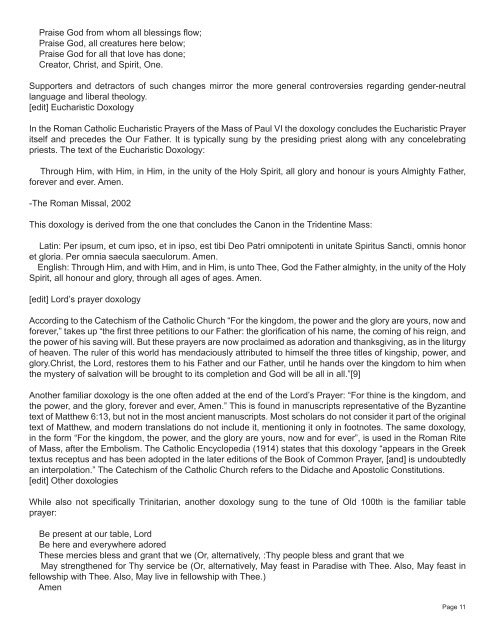Doxologies in the New Testament
Doxologies in the New Testament
Doxologies in the New Testament
Create successful ePaper yourself
Turn your PDF publications into a flip-book with our unique Google optimized e-Paper software.
Praise God from whom all bless<strong>in</strong>gs flow;<br />
Praise God, all creatures here below;<br />
Praise God for all that love has done;<br />
Creator, Christ, and Spirit, One.<br />
Supporters and detractors of such changes mirror <strong>the</strong> more general controversies regard<strong>in</strong>g gender-neutral<br />
language and liberal <strong>the</strong>ology.<br />
[edit] Eucharistic Doxology<br />
In <strong>the</strong> Roman Catholic Eucharistic Prayers of <strong>the</strong> Mass of Paul VI <strong>the</strong> doxology concludes <strong>the</strong> Eucharistic Prayer<br />
itself and precedes <strong>the</strong> Our Fa<strong>the</strong>r. It is typically sung by <strong>the</strong> presid<strong>in</strong>g priest along with any concelebrat<strong>in</strong>g<br />
priests. The text of <strong>the</strong> Eucharistic Doxology:<br />
Through Him, with Him, <strong>in</strong> Him, <strong>in</strong> <strong>the</strong> unity of <strong>the</strong> Holy Spirit, all glory and honour is yours Almighty Fa<strong>the</strong>r,<br />
forever and ever. Amen.<br />
-The Roman Missal, 2002<br />
This doxology is derived from <strong>the</strong> one that concludes <strong>the</strong> Canon <strong>in</strong> <strong>the</strong> Trident<strong>in</strong>e Mass:<br />
Lat<strong>in</strong>: Per ipsum, et cum ipso, et <strong>in</strong> ipso, est tibi Deo Patri omnipotenti <strong>in</strong> unitate Spiritus Sancti, omnis honor<br />
et gloria. Per omnia saecula saeculorum. Amen.<br />
English: Through Him, and with Him, and <strong>in</strong> Him, is unto Thee, God <strong>the</strong> Fa<strong>the</strong>r almighty, <strong>in</strong> <strong>the</strong> unity of <strong>the</strong> Holy<br />
Spirit, all honour and glory, through all ages of ages. Amen.<br />
[edit] Lord’s prayer doxology<br />
Accord<strong>in</strong>g to <strong>the</strong> Catechism of <strong>the</strong> Catholic Church “For <strong>the</strong> k<strong>in</strong>gdom, <strong>the</strong> power and <strong>the</strong> glory are yours, now and<br />
forever,” takes up “<strong>the</strong> first three petitions to our Fa<strong>the</strong>r: <strong>the</strong> glorification of his name, <strong>the</strong> com<strong>in</strong>g of his reign, and<br />
<strong>the</strong> power of his sav<strong>in</strong>g will. But <strong>the</strong>se prayers are now proclaimed as adoration and thanksgiv<strong>in</strong>g, as <strong>in</strong> <strong>the</strong> liturgy<br />
of heaven. The ruler of this world has mendaciously attributed to himself <strong>the</strong> three titles of k<strong>in</strong>gship, power, and<br />
glory.Christ, <strong>the</strong> Lord, restores <strong>the</strong>m to his Fa<strong>the</strong>r and our Fa<strong>the</strong>r, until he hands over <strong>the</strong> k<strong>in</strong>gdom to him when<br />
<strong>the</strong> mystery of salvation will be brought to its completion and God will be all <strong>in</strong> all.”[9]<br />
Ano<strong>the</strong>r familiar doxology is <strong>the</strong> one often added at <strong>the</strong> end of <strong>the</strong> Lord’s Prayer: “For th<strong>in</strong>e is <strong>the</strong> k<strong>in</strong>gdom, and<br />
<strong>the</strong> power, and <strong>the</strong> glory, forever and ever, Amen.” This is found <strong>in</strong> manuscripts representative of <strong>the</strong> Byzant<strong>in</strong>e<br />
text of Mat<strong>the</strong>w 6:13, but not <strong>in</strong> <strong>the</strong> most ancient manuscripts. Most scholars do not consider it part of <strong>the</strong> orig<strong>in</strong>al<br />
text of Mat<strong>the</strong>w, and modern translations do not <strong>in</strong>clude it, mention<strong>in</strong>g it only <strong>in</strong> footnotes. The same doxology,<br />
<strong>in</strong> <strong>the</strong> form “For <strong>the</strong> k<strong>in</strong>gdom, <strong>the</strong> power, and <strong>the</strong> glory are yours, now and for ever”, is used <strong>in</strong> <strong>the</strong> Roman Rite<br />
of Mass, after <strong>the</strong> Embolism. The Catholic Encyclopedia (1914) states that this doxology “appears <strong>in</strong> <strong>the</strong> Greek<br />
textus receptus and has been adopted <strong>in</strong> <strong>the</strong> later editions of <strong>the</strong> Book of Common Prayer, [and] is undoubtedly<br />
an <strong>in</strong>terpolation.” The Catechism of <strong>the</strong> Catholic Church refers to <strong>the</strong> Didache and Apostolic Constitutions.<br />
[edit] O<strong>the</strong>r doxologies<br />
While also not specifically Tr<strong>in</strong>itarian, ano<strong>the</strong>r doxology sung to <strong>the</strong> tune of Old 100th is <strong>the</strong> familiar table<br />
prayer:<br />
Be present at our table, Lord<br />
Be here and everywhere adored<br />
These mercies bless and grant that we (Or, alternatively, :Thy people bless and grant that we<br />
May streng<strong>the</strong>ned for Thy service be (Or, alternatively, May feast <strong>in</strong> Paradise with Thee. Also, May feast <strong>in</strong><br />
fellowship with Thee. Also, May live <strong>in</strong> fellowship with Thee.)<br />
Amen<br />
Page 11

















